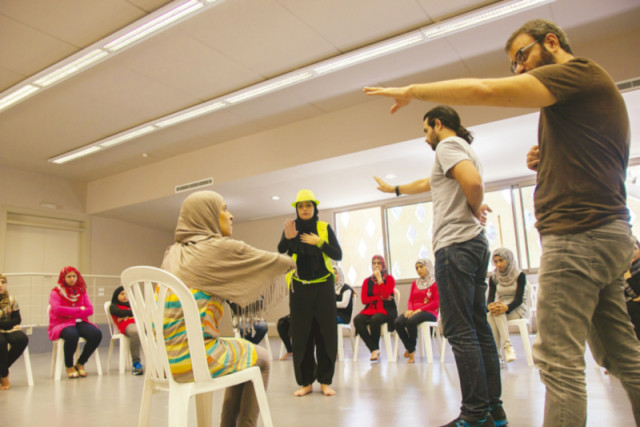Antigone rebels back
Syrian women refugees integrate their own stories of love and loss into the 2,500-year-old Greek tragedy.

British publication, The Independent added that the cast integrated their own stories of love and loss into the Greek tragedy written almost 2,500 years ago.
The cast consisted of 22 women who had never even seen a play let alone perform in one. The show which premiered at the Madina theatre was being rehearsed for more than a month to ensure that the women performing on stage are comfortable in their own body.

The play has become a therapeutic experience for many of the actors as it provided them with an opportunity to share their own stories.
Even a week before they were slated to go on stage for their first performance many women fought back tears during their final rehearsals after hearing stories that they had heard countless times before.
Rim, a 35-year-old primary school teacher who fled Damascus alongside her three children to “escape the sound of bullets” spoke of the importance of the stories saying that, “even if these are individual stories, they speak on our behalf.”
The majority of the play revolves around the stories of the several women acting in it. The personal accounts of these women were incorporated into the original narrative.
Antigone was a Greek tragedy written by Sophocles. The play follows the story of Antigone whose brother Polyneices is not given a burial by Creon, the new ruler of Thebes. The ruler instead states that the body of Polyneices shall not be sanctified by holy rites but will remain unburied on the battlefield causing Antigone to protest against Creon’s decree.
Mohamed Al-Attar who has adapted the play explained the reason for selecting a Greek tragedy such as Antigone as not only did he want to show the female perspective on the civil war but because, “It’s also a story of the individual versus the stage, and the individual versus authority.”
Most of the women participating in the play are being supported by their families but the husband of one of the performers is still convinced that she is going to a sewing workshop instead of a play rehearsal.
The play also touches upon several important themes of state control, civil disobedience, citizenship, fidelity and love for family.
Not only has the play been performed on stage but has also been adapted for screen. In 1961 the play was adapted into a Greek film directed by Yorgos Javellas and starred Irene Papas as the titular character.
Published in The Express Tribune, December 12th, 2014.
Like Life & Style on Facebook, follow @ETLifeandStyle on Twitter for the latest in fashion, gossip and entertainment.



















COMMENTS
Comments are moderated and generally will be posted if they are on-topic and not abusive.
For more information, please see our Comments FAQ